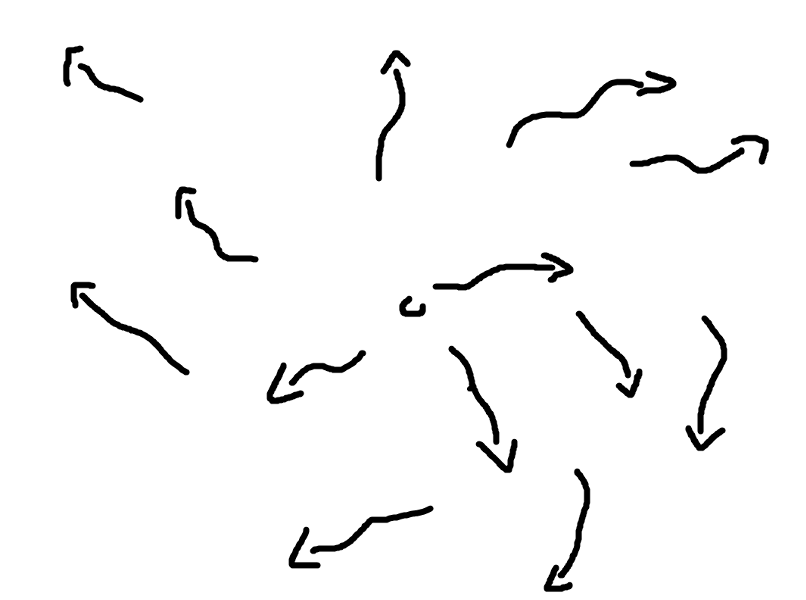Seminar Blogs
“Who Are We?” – Floor Mijland
In the Transmission in Motion seminar on November 18th, entitled “Plant-based Dramaturgy”, Liesbeth Groot-Nibbelink interviewed Manuela Infante about her performance Estado Vegetal (Vegetative State, CIM/Ae 2017), and the creative process leading up to this theatre piece. Infante uses her theatre practice as a way of thinking through academic ideas based in fields such as speculative realism, new materialist and plant-based philosophy (Utrecht University 2020). In Estado Vegetal, Infante’s aim was to give voice to non-human entities, such as plants, offsetting anthropocentric modes of thinking. Unfortunately, she discovered that trying to make plants ‘speak’ kept the anthropocentrism intact. It demanded plants to communicate like humans, causing an important ethical question to arise: How do you relate to something radically other without appropriating it?
 Instead of leaving the plants out, Infante stayed with the trouble, in true new materialist fashion, finding an answer in the plant-based philosophy of Michael Marder. Marder proposes to, instead of looking at what is human in plants, look at what is plant in humans, leading Infante to develop a ‘plant-based dramaturgy’. Looking at plants, Infante explains, it is important to understand that plants are multitudes: they have eyes, mouths, and brains in every root. Plants can branch out endlessly, and every root can be replanted to start this process anew. It is impossible to pinpoint where one plant ends and the other begins, which makes speaking of individuals impossible. Following this logic, in Estado Vegetal a few characters (portrayed by the same actress) tell stories centered around a tree in the middle of a borough. These stories involve and evolve around the tree, flowing into one another effortlessly, making the story of the tree richer with each added ‘branch’. Telling stories by branching out from a central point did not feel foreign to Infante, though it took some time to be able to use it dramaturgically. Our neurological structures, she states, seem to be more branch-like we might think.
Instead of leaving the plants out, Infante stayed with the trouble, in true new materialist fashion, finding an answer in the plant-based philosophy of Michael Marder. Marder proposes to, instead of looking at what is human in plants, look at what is plant in humans, leading Infante to develop a ‘plant-based dramaturgy’. Looking at plants, Infante explains, it is important to understand that plants are multitudes: they have eyes, mouths, and brains in every root. Plants can branch out endlessly, and every root can be replanted to start this process anew. It is impossible to pinpoint where one plant ends and the other begins, which makes speaking of individuals impossible. Following this logic, in Estado Vegetal a few characters (portrayed by the same actress) tell stories centered around a tree in the middle of a borough. These stories involve and evolve around the tree, flowing into one another effortlessly, making the story of the tree richer with each added ‘branch’. Telling stories by branching out from a central point did not feel foreign to Infante, though it took some time to be able to use it dramaturgically. Our neurological structures, she states, seem to be more branch-like we might think.
Infante’s ‘discovery’ of branch-like neurological structures reminded me of George Lakoff and Mark Johnson’s work on embodied cognition. In their introduction to Philosophy in the Flesh (1999), entitled “Who Are We?”, they explain that cognitive science has shown that “the mind is inherently embodied, [and o]ur understanding of what the mind is deeply [matters]” (Lakoff and Johnson 1999, 3). The mind has been inextricably tied to reason, and reason has been seen as the most defining characteristic of human beings. The ‘discovery’ of the embodied mind required Western philosophy to be critically reevaluated, opening up space for new understandings of reason and, therefore, ourselves (Lakoff and Johnson 1999, 3-4).
The discovery of the plant in humans, as portrayed in Estado Vegetal, challenges the viewer to rethink the relation between humans and plants. Reimagining our neurological structures as branch-like opens up the opportunity to rethink ‘human’ reason, and with it challenging humans to rethink themselves too. It may show us to view ourselves not so much as individuals, but more as multitudes. It might enable us to tell branch-like stories that can be replanted or retold over and over again, without pinpointing to one origin. We might begin to understand ourselves to be part of a multitude of humans and non-humans, challenging us to listen to other entities in our multitude, to whom we are connected by branch, without appropriating them.
References
- CIM/Ae. 2017. “ESTADO VEGETAL de Manuela Infante.” Accessed November 25, 2020. Vimeo video 1:21:38. https://vimeo.com/252358003.
- Infante, Manuela, interview by Liesbeth Groot-Nibbelink, Transmission in Motion, Utrecht University, November 18th, 2020.
- Lakoff, George and Mark Johnson. 1999. “Introduction: Who Are We?”, in Philosophy in the Flesh: The Embodied Mind and Its Challenges to Western Thought, pp. 3-7. Berkeley: Ingram Publisher Services.
- Utrecht University. 2020. “Transmission in Motion Seminar (2020-2021): “Plant-based Dramaturgy” – Manuela Infante (theatre director, Santiago de Chile).” Transmission in Motion (blog), Utrecht University. November 25th, 2020. https://transmissioninmotion.sites.uu.nl/transmission-in-motion-seminar-2020-2021-plant-based-dramaturgy-manuela-infante-theatre-direct or-santiago-de-chile/.
Image credits: Mijland, Floor W. 2020. Plant-based dramaturgy. Digital drawing.

